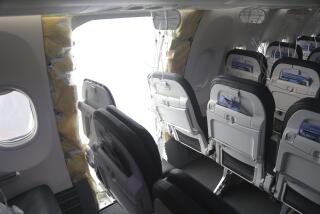FAA Proposes Aircraft Fuel Tank Review
- Share via
WASHINGTON — Building on information gathered since the in-flight explosion of TWA Flight 800 three years ago, the Federal Aviation Administration proposed a mandatory fuel tank design review Thursday for nearly all of the nation’s commercial air fleet--both jets and propeller-driven aircraft.
The proposal covers all commercial aircraft that carry 30 or more passengers, a total of about 6,000 aircraft. An FAA spokeswoman said the proposal covers more than 90% of U.S. commercial aircraft and is one of the largest such orders ever contemplated.
The effect of the FAA proposal, if adopted, is expected to be felt worldwide as foreign governments adopt similar rules. FAA officials said a number of foreign governments are working with them on the possible fuel tank problems.
FAA Administrator Jane Garvey called the proposal a “fundamental change in how fuel tanks are designed, maintained and operated.”
For the first time, the federal government hopes to deal with all three sides of what is called the “fire triangle”--ignition, fuel and oxygen--rather than focusing all its efforts on preventing an ignition that would touch off an explosion.
To accomplish this, the FAA is seeking new fuel system design standards for aircraft manufacturers that will minimize potential sources of ignition and also will either minimize the potentially explosive vapors or protect the aircraft from any fire or explosion that such vapors might cause. The government Thursday acknowledged that so far it simply wasn’t feasible to try to eliminate all fuel vapors.
Also, manufacturers would have one year to come up with new maintenance programs for existing planes’ fuel tanks and surrounding electrical wiring, with specific guidelines for aircraft operators to identify potential ignition sources before they develop into safety hazards. Airlines then would have six months to implement the procedures.
The FAA estimated the cost of the proposal at $170 million over 10 years, but agency officials said they were certain the cost figures would be disputed by the airline industry.
The agency said the certification standards and mandatory review were prompted by the TWA 800 tragedy that killed 230 people in July 1996 when a fuel tank on the Boeing 747 jet exploded shortly after takeoff from New York City on a flight to Paris.
More to Read
Inside the business of entertainment
The Wide Shot brings you news, analysis and insights on everything from streaming wars to production — and what it all means for the future.
You may occasionally receive promotional content from the Los Angeles Times.










